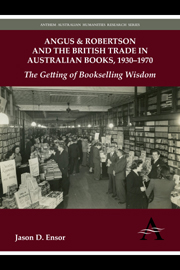 Angus & Robertson and the British Trade in Australian Books, 1930–1970
Angus & Robertson and the British Trade in Australian Books, 1930–1970 Book contents
- Frontmatter
- Contents
- Dramatis Personae
- Preface
- Acknowledgements
- Chapter 1 The Company that Loved Australian Books
- Chapter 2 The Overseas Books in Australian Publishing History
- Chapter 3 Triangles of Publishing and Other Stories
- Chapter 4 The World is Made of Paper Restrictions
- Chapter 5 The First Salesman in London
- Chapter 6 The Getting of Bookselling Wisdom
- Chapter 7 Preparing for ‘Operation London’
- Chapter 8 The Shiralee in the North
- Chapter 9 A Commercial and Cultural Relationship
- Chapter 10 Tomorrow, When London Publishing Ended
- Chapter 11 A House is Rebuilt
- Chapter 12 The Hidden Parts of Publishing Fortune
- Chapter 13 Learning from a Distance
- Figures and Tables
- Notes
- Bibliography
- Index
Chapter 2 - The Overseas Books in Australian Publishing History
Published online by Cambridge University Press: 05 July 2013
- Frontmatter
- Contents
- Dramatis Personae
- Preface
- Acknowledgements
- Chapter 1 The Company that Loved Australian Books
- Chapter 2 The Overseas Books in Australian Publishing History
- Chapter 3 Triangles of Publishing and Other Stories
- Chapter 4 The World is Made of Paper Restrictions
- Chapter 5 The First Salesman in London
- Chapter 6 The Getting of Bookselling Wisdom
- Chapter 7 Preparing for ‘Operation London’
- Chapter 8 The Shiralee in the North
- Chapter 9 A Commercial and Cultural Relationship
- Chapter 10 Tomorrow, When London Publishing Ended
- Chapter 11 A House is Rebuilt
- Chapter 12 The Hidden Parts of Publishing Fortune
- Chapter 13 Learning from a Distance
- Figures and Tables
- Notes
- Bibliography
- Index
Summary
[British publishers] have followed the precepts of guerrilla warfare: infiltrate the local scene; wrap yourself in righteous causes; do not neglect propaganda; organise tightly; retreat where necessary; [and] always avoid set-piece battles.
The above sentiment expressed by Robert Haupt in 1988 about the presence of British publishers in Australia and, by implication, overseas or imported texts in the local book trade, echoes other sentiments recorded decades earlier and equivalent complaints are heard today. Legally and commercially across the course of the twentieth century, British trading rights pertained to exclusive English-language rights throughout the former empire.2 Within this framework Australia was the largest export (or ‘run-on’)3 market for British books to 1959, valued at its peak to be worth £4,387,810 sterling in export turnover for British publishers;4 this value was a significant increase over Australia's estimated purchases of British books of £1.5 million sterling in 19485 and the second largest market for British books behind the United States after that time.6 During this period Australian booksellers, among whom the Australian firm Angus & Robertson doubled as publishers, were able to negotiate concessions from the peak organisation, the Publishers Association of Great Britain,7 prompting Hector MacQuarrie, managing director of Angus & Robertson's London office, to claim in 1949 that
The [Publishers Association] P.A. in the UK are all powerful and can dictate to [their] booksellers, inflicting sanctions when their orders are ignored or disobeyed.
- Type
- Chapter
- Information
- Angus & Robertson and the British Trade in Australian Books, 1930–1970The Getting of Bookselling Wisdom, pp. 11 - 28Publisher: Anthem PressPrint publication year: 2012


